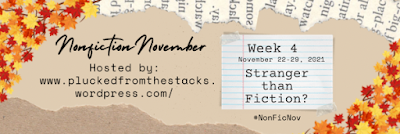November Nonfiction IV: Stranger Than Fiction
Week 4: (November 22-26) – Stranger Than Fiction with Christopher at Plucked from the Stacks: This week we’re focusing on all the great nonfiction books that *almost* don’t seem real. A sports biography involving overcoming massive obstacles, a profile on a bizarre scam, a look into the natural wonders in our world—basically, if it makes your jaw drop, you can highlight it for this week’s topic.
I've read a lot of jaw-dropping non-fiction this year, so it's hard to pick. I'm going to ignore the WWII titles, because so much of it is just inherently insane. From the rest, I've chosen two titles, and the links go to my original posts:
Are We Smart Enough to Know How Smart Animals Are? by Frans de Waal:De Waal chronicles the ineptitude of many of our attempts to categorize animal intelligence, and offers a whole lot of wonderful observations. I wrote...
...critters are constantly surprising biologists with what they can do, and cognition seems to work on a spectrum, instead of humans being completely separate from the rest of the animal world. De Waal regales us with story after story of animal ingenuity and learning that we can't yet comprehend. (How do you understand how a dog sees the world, much less an octopus?) It's fascinating and a lot of fun.
The history of humanity's attempts at dealing with mental illness is a very ugly one. Elizabeth Packard was not mentally ill, but she was sent to an asylum anyway -- and she spent the rest of her life working for reform and better care. The jaw-dropping part is, well, most of it. How women were treated at that time. How Elizabeth was treated, and the incredible blindness of the people who ran asylums. I said:
The story of how Elizabeth fought tirelessly for reform in mental asylums is a difficult one, and a testament to her incredible strength, intelligence, and persistence. It is absolutely gripping, and an important book to read, I think.
It's amazing to me that people could be so complacent and blind as to design a system that makes any feedback, complaint, information, or reform so impossible. But of course, we have quite a few systems like that ourselves. Humans are like that. So, I guess we each need to ask ourselves: "Do my beliefs and actions keep me open to new information or feedback, or do I tend to discount anything that would let me know about a need to change? Who do my beliefs serve -- just me, or the common good/people I care about? Do I ever allow myself to feel uncomfortable about things as they are?"







I almost included The Woman They Could not Silence, it was quite an incredible story. Thanks for sharing your recommendations
ReplyDeleteSuch a good point about the systems we humans trap ourselves in. I need to read that book, it sounds amazing.
ReplyDeleteLoved De Waal's book! It made my list as well!
ReplyDeleteI love your insight into humanity through The Woman They Could Not Silence. It is so true. We design systems for people not taking into consideration the people that must live / work in that system.
ReplyDeleteThese are two great selections for this week, but I'm particularly focused on The Woman They Could Not Silence. What an absolutely wild story.
ReplyDelete